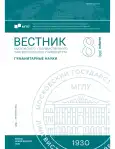Discursive Practices of Purist Movements in Historical Perspective
- 作者: Kosteva V.M.1
-
隶属关系:
- Russian State University for the Humanities
- 期: 编号 8(902) (2025)
- 页面: 77-83
- 栏目: Linguistics
- URL: https://bakhtiniada.ru/2542-2197/article/view/309473
- ID: 309473
如何引用文章
全文:
详细
The article analyzes the purist movements of the XVII–XX centuries in Europe. The relevance of
the study is connected with the constant interest of any society to the language of its country, to its defense against alien elements. The author makes an attempt to generalize the ideas of purism and their practical implementation as a set of discursive practices (as interpreted by M. Foucault), which allows us to consider purism as a linguistic phenomenon that has its own regularities of development and implementation. This generalization can initiate a fundamental study of purism as a multifaceted phenomenon, which can be based on the method of narrative lingvo-historiography.
作者简介
Viktoria Kosteva
Russian State University for the Humanities
编辑信件的主要联系方式.
Email: vmkosteva@gmail.com
Doctor of Philology (Dr. habil.), Associate Professor, Head of the Department for German Philology
俄罗斯联邦参考
- Kosteva, V. M. (2018). Lingvistika totalitarizma v lingvofilosofskoj paradigme XX veka = Linguistics of totalitarianism in the linguophilosophical paradigm of the 20th century: abstract of Senior Doctorate in Philology. Perm. (In Russ.)
- Thomas, G. (1991). Linguistic purism. London; New York: Longman.
- Polenz, P. von (1967). Sprachpurismus und Nationalsozialismus. In Germanistik – eine deutsche Wissenschaft (S. 113–160). Beiträge von E. Lämmert; W. Kilz, K. O. Conrady, P. von Polenz. Frankfurt am Main: Suhrkamp.
- Neustupn, J. V. (1989). Language purism as a type of language correction. In Jernudd, B. H., Shapiro, M. J. (Eds.), The politics of language purism (pp. 211–225). Berlin: Mouton de Gruyter.
- Basovskaja, E. N. (2011). Soviet linguistic purism: word and deed (on the material of periodicals of 1920–1930s). RGGU Bulletin. Literary Teory. Linguistics. Cultural Studies Series, 7, 114–124. (In Russ.)
- Pekarskij, P. P. (1863). Materialy k istorii zhurnal’noj i literaturnoj dejatel’nosti Ekateriny II = Materials to the history of journal and literary activity of Catherine II. St. Petersburg: Academy of Sciences Typography. (In Russ.)
- Kirkness, A. (1975). Zur Sprachreinigung im Deutschen 1789–1871. Eine historische Dokumentation. I. Forschungsberichte des Instituts für Deutsche Sprache. Mannheim. Vol. 26. Tübingen: Verlag Narr.
- Klimajte, D. Ju. (1989). Bor’ba za chistotu russkoj literaturnoj rechi v pervoj polovine 30-h godov sovetskoj jepoh i= Struggle for the purity of Russian literary speech in the first half of the 30s of the Soviet era: abstract of PhD thesis in Philology. Moscow. (In Russ.)
- Raffaelli, S. (1983). Le parole proibite: Purismo di stato e regolamentarione delle publicità in Italia (1812–1945). Bologna: Il mulino.
- Brumme, J. (1993). Die „Einheit Spaniens“ und die „Einheit der Sprache“ im Diskurs der Falange (1936–1939). In Bochmann, K., Sprachpolitik in der Romania: Zur Geschichte sprachpolitischen Denkens und Handelns von der Französischen Revolution bis zur Gegenwart (S. 382–407). Berlin; New York: Walter de Gruyter.
- Geers, M. E. Jazykovoj purizm v istorii Anglii i Germanii = Language purism in the history of England and Germany: abstract of PhD thesis in Philology. Moscow. (In Russ.)
- Ljafe, Je. (2001). Development of the book lexicon of the Albanian language in the second half of the 20th century. In Studia linguistica et balcanica: In memory of Agnia Vasilievna Desnitskaya (pp. 346–352). Collection of articles. St. Petersburg: Nauka. (In Russ.)
- Golino, E. (2010). Parola di Duce. Milano: RCS Libri S.p.A.
- Desnickaja, A. V. (1968). Albanskij jazyk i ego dialekty = Albanian language and its dialects. Leningrad: Nauka. (In Russ.)
补充文件










